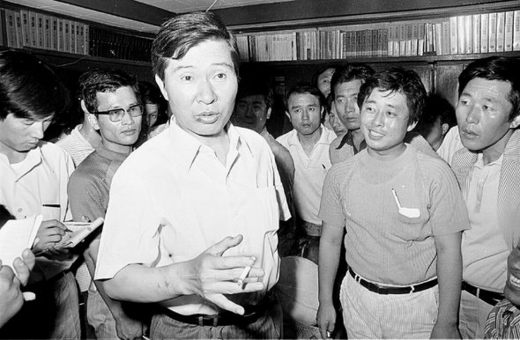 |
|
Kim Dae-jung holds a press conference in a Seoul hotel after being released from the kidnapping in 1973
|
Hold on query results done in name of relations with Japan
A National Intelligence Service committee has delayed the release of its findings on the 1973 kidnapping of former president Kim Dae-jung, then a politician and activist against the Park Chung Hee military regime. The delay was made in consideration of the Seoul-Japan diplomatic relationship, as Kim was kidnapped from a Tokyo hotel, and the Japanese government at the time has been accused of turning a blind eye to the incident. Regarding the delay, a high-ranking official of the presidential office said on September 26, "I can’t say that there is no diplomatic problem [with Japan]. But international law also should be considered." By mentioning "international law," the official was referring to an agreement to officially close the Japanese side of the investigation into the kidnapping. This decision was made at a meeting of then-South Korean prime minister Kim Jong-pil and his Japanese counterpart Tanaka Kakuei in Japan on November 2, 1973, about three months after the August 8, 1973 abduction. The meeting is considered by some to represent a tacit agreement from Japan to bury the investigation on behalf of the Park Chung Hee government. According to a record of the meeting between the two prime ministers in 1973, which was declassified on February 6 this year, Tanaka said, "We will be in trouble if someone like the advisor of the U.S. president foolishly reveals that [Park Chung Hee] gave an order [to me for the kidnapping]," while Kim Jong-pil said, "Something like that [absolutely] cannot happen."Based on this "diplomatic agreement," Tokyo protests to Seoul over the South Korean government’s taking issue with incidents which already were concluded, while Seoul urges the fact-finding committee to show a cautious reaction. Then-opposition leader Kim Dae-jung was kidnapped from a hotel in Tokyo, where he had relocated to stage an anti-government movement. The incident is one of representative examples of illegal political maneuvering conducted by the late Park Chung-hee regime. It is suspected that Kim Dae-jung was to be killed, but intervention by the U.S. ambassador to Korea at the time may have truncated the plan. Kim’s captors brought him back to Korea by boat. After the National Intelligence Service’s Development Committee for Clarifying the Past (NISDC) began to investigate the kidnapping in February 2005, Japan voiced its displeasure several times through diplomatic channels, and Seoul’s Ministry of Foreign Affairs and Trade also urged the NISDC to respond cautiously to Japanese complaints, sources say. The NISDC has said it would disclose the investigation results at the end of this month or the beginning of next month, but it has failed to set an exact date. The NISDC has already announced its investigation results for six other incidents in modern Korean history, including disappearances and oppression of dissident groups under the former military regimes as well as the 1987 bombing of a Korean Air Lines jet by North Korean agents. A high-ranking official of the committee said, "If Japan puts demands on the investigation, that represents intervention in the internal affairs of our nation, and such a situation will eventually have a negative effect on South Korea-Japan relations. When we try to cover up the truth, there will be diplomatic problems. We are trying to clarify the truth. The Japanese government should learn from France and Germany’s future-oriented attitude" of helping South Korea investigate other incidents involving the military regimes in their countries, added the official, who asked not to be named. Meanwhile, Japan’s Sankei Shimbun reported that the fact-finding committee will announce the results of the investigation on the Kim Dae-jung kidnapping as soon as possible and the Japanese police authorities have decided to probe the incident again, quoting a Japanese official.






